Page 2
Fellowship Winners
BC grads and undergrads earned Fulbright, Gilman, and Critical Language Scholarships, among other honors
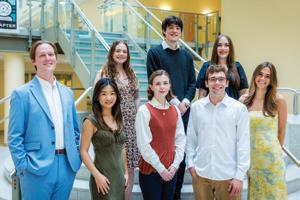
Pages 8 and 9
Parting Thoughts
Retirees look back on their years at the Heights
PUBLISHED BY THE BOSTON COLLEGE OFFICE OF UNIVERSITY COMMUNICATIONS
COMMENCEMENT 2024
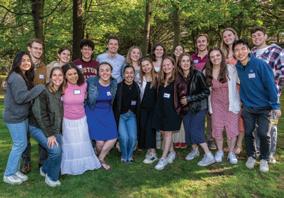
Page 10
Showing Appreciation A May 10 celebration honors graduates who are going on to full-time service work
Cardinal: Work Together to ‘Make All Things New’
BY SEAN SMITH CHRONICLE EDITOR
Cardinal Stephen Chow, S.J., who as bishop of Hong Kong has advocated a rapprochement between the Vatican and China, implored the Boston College Class of 2024 to strive for unity and understanding in a time of division and discord.
“We must start with the promotion of dialogue and constructive action among parties of different stances, prudently and meaningfully,” he told the Alumni Stadium audience at Monday’s 148th Commencement Exercises, urging them to reject the narrative which holds that only one side can be right and dominant and instead work toward a commonly desirable future—one which “you and your peers are going to construct together with the inclusive love of God in your discernment, transcending the borders of politics, beliefs, faiths, values, economies, ethnicities, and realities.
“Dear graduates, it is not too early to contemplate how you are going to construct
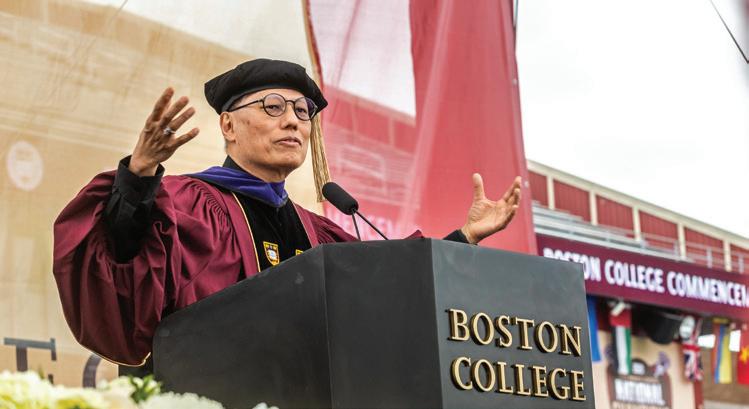
your future together, and what it will look like,” said Cardinal Chow, who was awarded an honorary Doctor of Laws degree for his “commitment to the Catholic faith as a means to inspire and unite.”
In addition to Cardinal Chow, the University presented honorary degrees to: former BC and pro basketball player turned entrepreneur Dana Barros ’89; Sister Maria Teresa de Loera Lopez, M.S. ’19,
a beloved servant of the poor in Mexico; Boston Health Care for the Homeless President James O’Connell; and Boston Public Schools Superintendent Mary Skipper. [Honorary degree citations are on page 4.]
In his Commencement greeting, University President William P. Leahy, S.J., praised the Class of 2024: “Boston College is a better place because of them, especially their energy, goodness, and generosity. They started amid the challenges of COVID-19 and persevered; we remember and are grateful.”
Foreshadowing Cardinal Chow’s remarks, Fr. Leahy pointed to global flashpoints such as Ukraine, Gaza, Haiti, and Sudan as indicating the need for “people of intelligence, faith, and commitment to work for the good of society, to help root out racial, social, and economic inequality, and to strive to bring an end to poverty, illiteracy, and prejudice.”
Fr. Leahy gave his customary invitation for family and friends of the graduates to
Continued on page 4
“You can see the research taking place at Boston College having an impact in real time in the world. You can see interventions developed by social scientists or education scholars. You can see our researchers in the natural sciences creating a greater understanding of our physical world.”
—Thomas Chiles
BY SEAN SMITH CHRONICLE EDITOR
A mobile app created to provide a gateway to the American asylum system for migrants at the United States-Mexican border holds promise but sorely needs improvement, according to a new study by Boston College School of Social Work Assistant Professor Alejandro Olayo-Méndez, S.J.
The report, published by Jesuit Refugee Service USA, says that U.S. migration policy has added a “digital barrier” to the border, describing the U.S. Customs and Border Protection’s CBP One app as “a narrow pathway to entry in the U.S. for individuals and families seeking safety.” Those able to obtain reliable information
and an appointment with CBP One will find that the app “provides much needed relief from threats to security and overall well-being.”
But the limitations of the current CBP One app, along with other factors, mean that the many thousands of migrants seeking entry to the U.S. continue waiting for an appointment while facing serious health and safety concerns, warned the report, “Navigating the U.S.-Mexico Border,” which examines the digital practices of migrants and their psychosocial needs and includes a series of recommendations for improving the scope and efficiency of the asylum system.
“People need to have a step-by-step un-
Sponsored Research at BC to Eclipse the $80M Mark
BY ED HAYWARD STAFF WRITER
Research funding from government agencies, private foundations, and other external sources this year is expected to top the $80-million mark for the first time in Boston College history, a milestone that faculty and administrators attribute to nearly two decades of strategic initiatives and investment.
So-called sponsored research is projected to total $83 million this year, according to the Office of the Provost. External funding garnered by BC faculty has risen steadily, from $57 million in 2020 to $73 million last year. The funding gains follow another benchmark: In 2016, BC was named an R1 research university, the highest ranking bestowed by the Carnegie Classification of Institutions of Higher Education.
MAY 23, 2024 VOL. 31 NO. 18
Cardinal Stephen Chow, S.J., speaking at Monday’s Commencement Exercises.
BCSSW Researcher
‘Digital Barrier’ to Migration
Studies
Continued on page 7 Continued on page 7
photo by lee pellegrini
PUBLISHED BY THE BOSTON COLLEGE OFFICE OF UNIVERSITY COMMUNICATIONS
Fellowship Winners Include 11 Fulbright Scholars
Boston College alumni and undergraduates have received an assortment of prestigious fellowships in recent months.
•Eleven Boston College graduates—including eight from the Morrissey College of Arts and Sciences Class of 2024—were selected for Fulbright Scholarships, which support a year’s post-baccalaureate study abroad: Griffin Bassett (English Teaching Assistant Award), Germany; Sophia Brady (Postgraduate Open Study/Research Scholarship), Australia; Catherine Brewer (English Teaching Assistant Award), Germany; Anna Davis (Fulbright Combined Award), Austria; Eunice Ham (English Teaching Assistant Award), South Korea; Frances Grace Hart ’23 (Open Study/Research Award), Netherlands; Tristan Leitz (Fulbright Combined Award), Austria; Allison Pellegrino (Open Study/Research Award), Kuwait; Noah Singer ’23 (English Teaching Assistant Award), Germany; Stephen Ventura ’22 (Fulbright-Luiss Award for Master’s Program in Business, Government, Law, and Political Economics), Italy; Charles Ward (English Teaching Assistant Award), Germany.
BC has been ranked consistently among the nation’s top producers of student Fulbright winners, according to statistics compiled by The Chronicle of Higher Education Recipients are chosen for Fulbrights, which are sponsored by the United States Department of State’s Bureau of Educational and Cultural Affairs, on the basis of academic merit and leadership potential.
•Fulbright recipient Frances Grace Hart, who graduated from the Morrissey College of Arts and Sciences last December, also won a National Science Foundation Graduate Research Fellowship, which seeks to broaden participation of the full spectrum
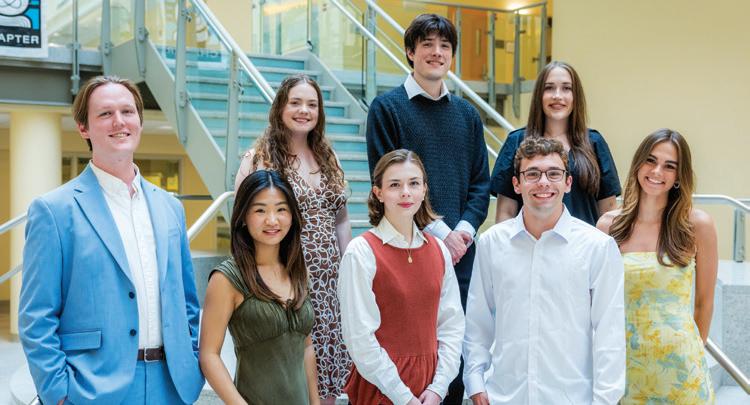
of diverse talents in STEM. The five-year fellowship provides three years of financial support. Her research proposal was titled “A computational investigation of the influence of death attitudes and religious identity on high-risk behaviors.”
•Sancia Sehdev ’25 (MCAS) received a Barry Goldwater Scholarship, the nation’s premier undergraduate award in the sciences. [See bit.ly/Sancia-Sehdev-Goldwater]
•A David L. Boren National Security Education Program Scholarship, which enables American undergraduates to study abroad in areas of the world that are critical to United States interests and underrepresented in study abroad, was awarded to Lucas Geromini ’26 (Connell School of Nursing), who will study Arabic in Amman, Jordan. Ethan Erickson ’26 (MCAS) was selected as an alternate Boren candidate to study Croatian, and will participate in the
“BC in Croatia: War, Peace and Reconciliation” program in Zagreb, Croatia, next spring.
•Selected for Critical Language Scholarships were Jess Navarette, a doctoral student in theology, to study Hindi, and Julia Lovas ’25 (MCAS) and Mattheus Tiger Braga ’24 (Carroll School of Management) for the study of Chinese. The program, sponsored and overseen by the U.S. Department of State, is part of a larger government effort to expand the number of Americans studying and mastering foreign languages that are crucial to U.S. national security, economic prosperity, and engagement with the world.
•Amen Amare ’26 (MCAS) received a scholarship from the Fund for Education Abroad program, which supports students with financial need who are underrepresented among the U.S. study-abroad popula-
tion. She will take part in the BC faculty-led summer program “The European Union: The Economic and Political Shaping of Europe” in Lisbon.
•The Omar A. Aggad Travel and Research Fellowship program was established through the gift of a Boston College family to inspire BC students to expand their understanding of the Arab world, and of the relationships between Arab societies and the West. Fellowships were recently awarded to MCAS undergraduates Sophie Termaat ’25, for her spring semester research project in Cairo, “Women in Egypt: A Comparative Analysis of Legal and Social Status from Ancient to Contemporary Times,” and Samiksh Jain ’25, for his summer term research project in Kuwait, “Queer Existence in an Islamic Nation: Analyzing Legal, Religious, and Health Perspectives.”
•The U.S. Department of State’s Benjamin A. Gilman International Scholarship Program enables students of limited financial means to study or intern abroad, providing them with skills essential to American national security and economic prosperity. Recent Gilman awardees from BC include Morrissey College students Madison Knapp ’25, for study in Sweden; Camille Longabardi ’25, Spain; Nnenna Okorie ’26, Ghana; Julie Huynh ’26, Ireland; Eileen Kim ’26, Spain; and Rebecca Atkins ’26 and Nicole Carrara ’26, UK. In addition, Lamar Duncan ’24 received a Gilman to study in the Netherlands last fall.
•Theodore Wind ’25 (CSOM) received the highly selective Japanese Student Services Organization Scholarship award, offered to qualified international students to help with their study and research expenses in Japan. —University Communications
University a Partner in Business Ethics Summit at Vatican City
Boston College is the co-sponsor of a major international summit on business ethics to be held in Vatican City next month.
The Business Ethics Summit, which takes place on June 4 on the premises of the Pontifical Academy of Sciences, will gather 70 high-profile international contributors including CEOs, representatives of the Vatican, academic lecturers, and the most relevant institutional stakeholders to share their visions on business ethics, according to organizers. Representing BC will be Brian Smith, the David S. Nelson Chair and associate dean for research in the Lynch School of Education and Human Development.
“Today, all companies are called upon to
ASSOCIATE VICE PRESIDENT FOR UNIVERSITY COMMUNICATIONS
Jack Dunn
SENIOR DIRECTOR FOR UNIVERSITY COMMUNICATIONS
Patricia Delaney
EDITOR Sean Smith
reflect on their ability to manage the onset of ethical dilemmas that may affect their decision-making process,” reads the event announcement. “Applying certain ethical and moral principles to the corporate dimension can help create attractive businesses both internally and externally and inspire the transformation of the business into the engine of sustainable and equitable economic growth. In this context, the Business Ethics Summit aims at analyzing the theme of ethics applied to business through the comparison and analysis of best practices and case studies.”
The summit seeks to offer an overview on ethical and moral principles to explore how companies can be ethically led accord-
CONTRIBUTING STAFF Phil Gloudemans Ed Hayward Audrey Loyack Rosanne Pellegrini Kathleen Sullivan
PHOTOGRAPHERS
Caitlin Cunningham Lee Pellegrini
ing to the guiding principle “from growth to prosperity,” which brings the concept of financial growth back into a human dimension.
Each participant will make a threeminute presentation to provide the basis for a highly interactive debate, the collective knowledge informing “an innovative case study on how to implement ethical principles in the workplace.”
“The theme of the summit is very well aligned with the Boston College mission, taking a holistic perspective on how people interact with technology, and including ethical and spiritual dimensions in our reflections about how technology can serve and not impede humanity,” said Stanton
E.F. Wortham, the Charles F. Donovan, S.J., Dean of the Lynch School.
This is the second convening of the Business Economics Summit. Last year’s event revolved around four main pillars: the human economy, the tech economy, the climate economy, and the impact economy.
Participants explored the ideas of philosophers John Stuart Mill, Immanuel Kant, Aristotle, and Confucius, and discussed how to apply those principles to the business world.
BC joins this year’s event as its academic partner. Other partners include Lunasa Human Academy, Ferrovie dello Stato Italiane, and Axpo Holding. For more on the summit, see www.businessethics.ai.
—University Communications
The Boston College Chronicle (USPS 009491), the internal newspaper for faculty and staff, is published biweekly from September to May by Boston College, with editorial offices at the Office of University Communications, 3 Lake Street, Brighton, MA 02135 (617)552-3350.
Distributed free to faculty and staff offices and other locations on campus.
Periodicals postage paid at Boston, MA and additional mailing offices.
POSTMASTER: send address changes to The Boston College Chronicle, Office of University Communications, 3 Lake Street, Brighton, MA 02135.
A flipbook edition of Chronicle is available via e-mail.
Send requests to chronicle@bc.edu.
May 23, 2024
www.bc.edu/bcnews chronicle@bc.edu Chronicle
2 Chronicle
BC Fulbright Scholars include (front, L-R) Charles Ward, Eunice Ham, Frances Grace Hart, Tristan Leitz, Anna Davis, (back, L-R) Catherine Brewer, Griffin Bassett, and Sophia Brady. photo by caitlin cunningham
Grant Will Aid BC Law Initiative on Racial Wealth Gap
BY PHIL GLOUDEMANS STAFF WRITER
A two-year grant will aid an innovative Boston College Law School project designed to help close the racial wealth gap through community legal education about estate planning for Greater Boston Black and brown families seeking to purchase or retain a home.
BC Law’s Initiative on Land, Housing & Property Rights (ILHPR), along with its partners, the Massachusetts Affordable Housing Alliance (MAHA) and the Legal Services Center of Harvard Law School, were recipients of an inaugural, $350,000 impact grant from the Harvard & Legacy of Slavery Initiative’s Reparative Partnership Program (H&LS).
The award was one of seven conferred this spring by H&LS, established last year to address systemic inequities affecting descendant communities of formerly enslaved people, and stems from Harvard’s efforts to ameliorate its legacy of slavery through “meaningful, visible, and effective actions.”
Under its project titled “A Homeownership Estate Planning Project to Close the Racial Wealth Gap,” ILHPR will partner with MAHA to build an estate planning module and curriculum for community legal education estate planning workshops,
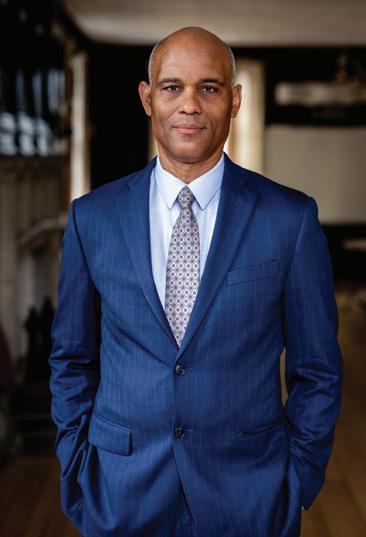
which the nonprofit housing organization will employ in its work with first-time, low-income homebuyers in both cities, and with some homeowners after they have purchased their properties. An estimated 1,100 people are expected to attend the workshops in each of the grant’s two years.
“We are very grateful for the impact grant, particularly given the robust number of excellent proposals H&LS received from
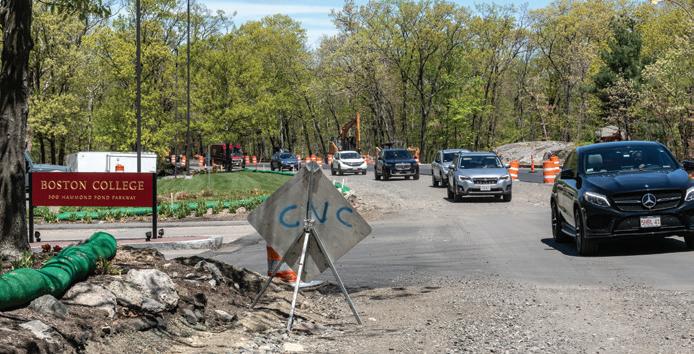
Hammond Pond Parkway Update
With preparations complete for the redesign of the Hammond Pond Parkway, a two-mile park roadway south of the Chestnut Hill Campus that links many communities south and west of the University—which owns property at 300 Hammond Pond Parkway—construction is now in progress.
The two-year, $11.3-million project began in December with tree removal and pruning, site protection, as well as drainage and infrastructure work. Crews removed the old asphalt and are re-paving the roadway with a binder coat to make the road passable, one lane in each direction.
Undertaken with support from the administration of Massachusetts Governor Maura Healey and the City of Newton, the project aims to enhance safety and accessibility for pedestrians, cyclists, and vehicles between Beacon Street and Route 9, particularly to the Hammond Pond Reservation
Drinan Chair Thomas Mitchell, director of the BC Law Initiative on Land, Housing & Property Rights: “Our goal is to put nonprofits in a better position to educate their clients about the importance of estate planning for future generations so that they can better preserve their homes and other assets.”
of a will or other type of estate plan can pose substantial problems for disadvantaged people who want to pass down their wealth—including their homes and land— to the next generation.”
Mitchell noted that the loss of homes attributable to a lack of estate planning is significant, and contributes to the fact that Black families in the Greater Boston area have an average net worth of $8, compared to the $247,000 average net worth for white adults.
around the country,” said ILHPR Director and founder Thomas W. Mitchell, the Robert F. Drinan, S.J. Endowed Chair at BC Law. “We truly appreciate Harvard University and its H&LS Initiative for recognizing the potential impact of our proposal and for this generous funding, which we will utilize to help Boston and Cambridge descendant communities preserve their homes.”
Launched in 2022, ILHPR seeks to preserve and expand property rights for disadvantaged communities across the United States by producing research, devising legal reform and policy solutions, engaging in community outreach, training law students, and drawing on other complementary strategies.
“Compared to the percentage of white adults, 40 percent fewer Black and brown adults have a will or some other type of estate plan, with the will-making rate for Black and brown families barely hovering over 20 percent,” said Mitchell. “The lack
Snapshot
and the Webster Conservation Area.
The installation of a curb on the eastern sidewalk and preparations for the eastern side pathway are underway, along with traffic signal road crossings near The Shops at Chestnut Hill. Crews will also complete a street lighting conduit between The Shops and Beacon Street.
Over the summer and into the fall, crews will begin installing new street lighting, west side curbing, a walkway and path, and undertake landscaping and plantings in the area. Work on the Beacon Street intersection also will begin.
During the lengthy construction period, commuters to BC using the Hammond Pond Parkway should expect delays and periodic detours and are encouraged to use alternate routes to the Main Campus.
The project is expected to finish up in late fall 2025.
—Phil Gloudemans
“Our goal is to put nonprofits in a better position to educate their clients about the importance of estate planning for future generations so that they can better preserve their homes and other assets,” he said. “Additionally, 30 to 40 families who attend the community legal education workshops will have wills, simple trusts, or other types of estate plans drafted for them by one of the Legal Services Center of Harvard Law School clinics. We hope our project will have a significant impact and that it can then be replicated.”
A national expert on property issues facing disadvantaged families and communities, Mitchell has engaged in extensive law reform and policy work. He is the principal author of the widely adopted Uniform Partition of Heirs Property Act (UPHPA), designed to substantially enhance the ability of disadvantaged families to maintain property ownership and their generational wealth.
The UPHPA has been adopted by 24 states and other jurisdictions to date, making it one of the most successful uniform real estate property acts that the Uniform Law Commission has promulgated in the past 30 years. Mitchell also has helped draft some congressional bills, including recently introduced heirs’ property legislation.
For more on ILHPR, see bc.edu/bc-web/ schools/law/centers/land-initiative.html

This spring, the Office of University
a Senior Gift fundraiser that included costumed teams of graduating seniors
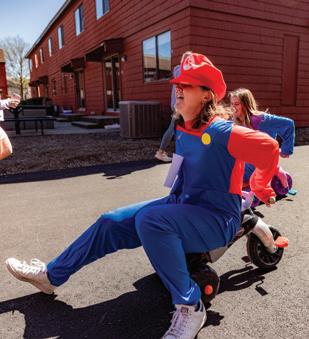
May 23, 2024
Roadwork earlier this month at the entrance to 300 Hammond Pond Parkway.
photo by lee pellegrini
photo by caitlin cunningham
Advancement hosted the annual “Mods 500,”
racing around the Mods on tricycles.
The Wheel Deal
3 Chronicle
PHOTOS BY CAITLIN CUNNINGHAM
For 32 years, Mary Skipper has served public and private schools in Greater Boston with an unwavering commitment to learning and providing support for disadvantaged students.
As the superintendent of the Boston Public Schools since 2022, she has focused the district on enhancing academic performance while creating a more favorable environment for multilingual learners and students with disabilities. Inspired by a fifth-grade teacher who instilled in her a love of reading, she became a teacher and began her career at Boston Latin Academy and Boston College High School, followed by 17 years in Boston public schools. She served as the founding headmaster and chief education officer of TechBoston Academy, a pilot school hailed as a national model for its cutting-edge curriculum and college placement success. As the network superintendent for Boston’s secondary schools, she supervised 34 high schools with nearly 20,000 students, helping them achieve the lowest dropout and highest graduation rates in the district’s history. Prior to being named superintendent in Boston, she led the Somerville Public Schools for seven years, helping the district to improve academic outcomes, while stemming withdrawals.
For her lifelong contributions to education and advocacy for all students, Boston College awards Mary Skipper the degree of Doctor of Science in Education, honoris causa.
Sister Maria Teresa de Loera Lopez, of the Congregation of Catholic Teachers of the Sacred Heart of Jesus, has been a dedicated servant of the poor in her native Mexico, as well as in Venezuela and Peru, where she has worked to build communities united in faith. Her commitment to religious education and pastoral care brought her to Boston College in 2014, one of a pioneering cohort of women religious in Catholic Extension’s U.S.-Latin American Sisters Exchange Program.
She earned a master’s degree in applied leadership studies from the Woods College of Advancing Studies, which enabled her to use her leadership and ministerial skills to better serve those in need. After returning to Mexico, she led a large religious education program encompassing 60 parishes in the northern state of Chihuahua. To train catechists, she travels to distant parishes on dangerous roads where kidnappings are frequent. Despite the inherent risks, she is determined that no corner of her diocese be denied the love and compassion of
‘Honoris Causa’
Honorary Degree Citations
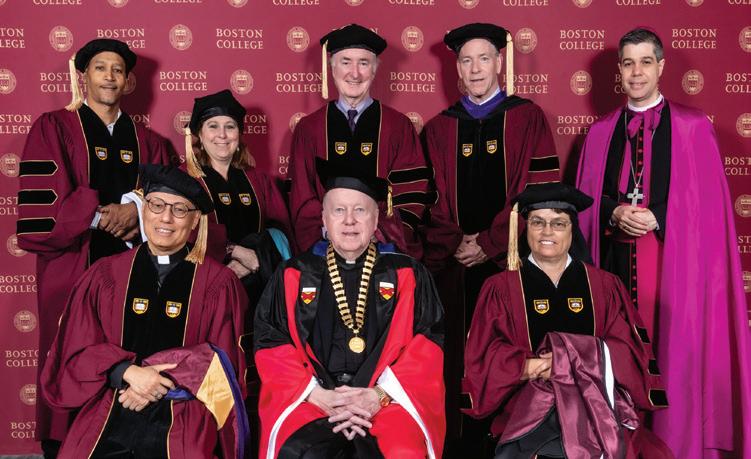
the Church.
For her courage, devotion to her vocation, and commitment to religious education, the University confers upon Sister Maria Teresa de Loera Lopez the degree of Doctor of Humane Letters, honoris causa.
Dr. James O’Connell has made caring for the homeless his life’s work. Known by his patients as “Doctor Jim,” he is the founding physician and president of Boston Health Care for the Homeless Program, which provides comprehensive, high-quality health care for those experiencing homelessness. Operating in shelters, in hospitals, and on the streets, the program utilizes an integrated team of providers to deliver services to more than 10,000 individuals each year. A New England native, he graduated from Harvard Medical School and completed his residency at Massachusetts General Hospital.
In 1985, despite having a prestigious fellowship in oncology awaiting him, he accepted a one-year post as a doctor for a new outreach program serving Boston’s homeless. Working at the Pine Street Inn and traveling by van to reach those living in the shadows changed the trajectory of his life. He became a “street
doctor,” and for 40 years has provided medical care and personal connection to those most in need. Under his leadership, Boston Health Care for the Homeless Program has been an innovator—opening the nation’s first medical respite care facility for homeless patients and creating the first electronic medical records system for the homeless.
In recognition of his compassionate and exemplary care of society’s most vulnerable, Boston College awards James O’Connell the degree of Doctor of Laws, honoris causa.
A Boston native and product of Catholic schools who became one of the greatest basketball players in Boston College history and an all-star during a distinguished 13-year National Basketball Association career, Dana Barros has led a life characterized by dedication, entrepreneurship, service, and mentoring.
The first Boston College basketball player to score more than 2,000 career points, he was inducted into the Varsity Club Athletic Hall of Fame in 2005 and his number was retired in 2017. While at BC, he was known for his kindness, humility, and infectious personality— traits that remain with him to this day. Since retiring from the NBA, he has excelled as an
entrepreneur, public speaker, coach, television analyst, and leader of Boston’s Department of Recreation. He has also returned to the Heights to mentor young Eagles, and is the proud father of two BC graduates. In 2018, he opened a youth basketball club that bears his name. Ranked among the top ten basketball training centers in the U.S., it hosts practices, AAU games, tournaments, and camps for aspiring young athletes.
For a career marked by great achievement on and off the court, and for service to young people throughout Greater Boston, Boston College awards Dana Barros the degree of Doctor of Humane Letters, honoris causa.
Cardinal Stephen Chow, S.J., has dedicated his life to promoting education, the Catholic faith, and the common good. As the bishop of Hong Kong, named cardinal by Pope Francis in 2023, he has worked diligently to improve relations between the Vatican and China, which have lacked diplomatic ties for more than 70 years. Longing for his native Hong Kong to be a bridge-building church between Rome and Beijing, he became the first Hong Kong bishop in nearly four decades to visit the Chinese capital, and hosted Beijing’s Archbishop Joseph Li Shan in the first-ever visit by a Beijing bishop to Hong Kong.
A devoted supporter of education, he has served as the supervisor of two Jesuit colleges in Hong Kong, chair of the Commission for Education of the Jesuit Province in China, and as a professor of psychology at the Holy Spirit Seminary of Hong Kong. While province superior of the Chinese Jesuits from 2018 to 2021, he worked with the Beijing Center to enhance dialogue and friendship between China and other cultures—in the tradition of 16th-century Jesuit missionary Matteo Ricci, S.J. A renowned scholar, he earned degrees in psychology from the University of Minnesota, philosophy from Dublin’s Milltown Institute of Theology and Philosophy, theology from the Holy Spirit Seminary, organizational development from Loyola University of Chicago, and human development and psychology from Harvard University, where he received a doctoral degree in 2006.
For his commitment to the Catholic faith as a means to inspire and unite, Boston College awards Cardinal Stephen Chow, S.J., the degree of Doctor of Laws, honoris causa.
University Bids Farewell to the Class of 2024
Continued from page 1
stand so that the Class of 2024 and others in Alumni Stadium could thank them with a round of applause “and a quiet prayer.” He also cited the valuable role of BC faculty and staff and the “generous gifts of time, advice, and financial resources from Boston College alumni, friends, and benefactors” in the graduates’ success at the Heights.
Cardinal Chow—who praised BC for “being bold enough to hold a live Commencement” given recent tensions on college campuses—shared five learnings he said could serve as the basis for fostering reconciliation and harmony in a divided world: “a preferential option for unity, not uniformity”; “collaboration with love so as to give hope”; “expect and respect differences out of love”; “be a bridge-builder”; and “be your own winner.”
He touched on his own efforts at bridgebuilding between the Catholic Church in mainland China and the universal Church, during his visit to Beijing last year and other dioceses last month. Although there were attempts to “package these trips with a political wrapper,” he said, the main objectives were to promote dialogue and friendships, and look for opportunities to collaborate while supporting each other’s pastoral endeavors.
“One insight that I have gained is that everyone, no matter whether she or he is an important official or not, would love to be connected, treated with genuine respect, and listened to with interest. I am never good at small talk, but I am learning to listen with empathy. With this, we can relate to each other with openness for mutual
development.”
Cardinal Chow also urged graduates to look beyond a culture that emphasizes winner-take-all competition.
“Instead of competing with others, we can work hard on bettering our past selves, better than who we were yesterday, a month, a year, or a decade ago. Am I noticeably or sufficiently better in the endeavor than where I was last? So, if the focus of competition is on ourselves, we can afford to help each other improve, so that no one will lose out, which means we can become winners in our own right.”
He added, “This is what I have understood from Jesuit education. I believe you and we are the ones who can work together, and with God, to make all things new.”
Also at the ceremony, Francis (Fran)
Hodgens received the 2024 Edward H. Finnegan, S.J., Award as the graduating senior who best exemplifies the University’s motto, “Ever to Excel” [see story on page 5], while Professor of Economics Joseph Quinn, a highly respected teacher, mentor, and colleague who has held key leadership positions at Boston College, was presented with the Saint Robert Bellarmine, S.J., Award in recognition of his distinguished career and significant role in advancing the University’s mission.
Following the main Commencement event, the 4,488 members of the Class of 2024 received their undergraduate and graduate degrees at separate ceremonies held around campus. The 2024 Commencement Exercises may be viewed at bit.ly/2024-Commencement-YouTube
May 23, 2024
Front, L-R: Cardinal Stephen Chow, S.J.; University President William P. Leahy, S.J.; Sister Maria Teresa de Loera Lopez. Back, L-R: Dana Barros; Mary Skipper; Dr. James O’Connell; Trustees
Chairman John Fish; Archdiocese of Boston Auxiliary Bishop Cristiano G. Borro Barbosa.
4 Chronicle
photo by lee pellegrini
Hodgens ‘Raises the Horizons of Others’
BY ROSANNE PELLEGRINI STAFF WRITER
Known on campus as “Mr. BC,” Francis (Fran) Hodgens is the recipient of the 2024 Edward H. Finnegan, S.J., Award as the graduating senior who best exemplifies the University’s motto, “Ever to Excel.” The Carroll School of Management grad was presented with the honor by University President William P. Leahy, S.J., at Monday’s Commencement Exercises.
Hodgens’ undergraduate years have been defined by superlatives, including a perfect grade point average. A member of the Gabelli Presidential Scholars Program, he has been both a peer leader and mentor, and has shared his time and talents through extracurricular pursuits both on and off campus. He is admired by faculty for his curiosity and drive, as well as for his humility and kindness.
“In Fr. Finnegan’s name and spirit, this award was created for a senior devoted to others, without seeking special recognition in return. This closely describes Francis (Fran) Hodgens,” wrote Carroll School Senior Associate Dean of the Undergraduate Program Ethan Sullivan in his nomination letter. “He is regarded as the unique student who consistently is at the top of his class, yet always raises the horizon of others.”
Hodgens majored in accounting for finance and consulting and business analytics. In September he will join Boston Consulting Group, regarded as one of the three most prestigious firms in the management consulting industry.
“I am immensely grateful for the amount of time and care my professors and mentors put into nominating me for this award,” Hodgens said. “I feel honored, and profoundly lucky, to win it. There are too many people at this school to name who I have witnessed putting in hundreds of hours of work to make BC the best it can be, without the expectation of anything in return.”
When he arrived as a freshman, his goals were “to pursue things that were difficult—since accomplishing hard things is rewarding—and to have as much fun as possible along the way. BC is where joy and achievement intersect. Without the football tailgates in the fall, or BC students’ boundless energy on Marathon Monday, this school would not be the same. I would argue that BC’s culture of joy in traditions is what helps students achieve the heights of success they do. I have been able to reach higher than I ever thought possible when I entered this school.”
Beyond excelling in his coursework, the Hopedale, Mass., resident successfully represented the Carroll School in several case competitions at BC and beyond, was an undergraduate research fellow for three professors, a teaching assistant, and was active in the Fulton Leadership Society (FLS). His mentors in that organization “played an unparalleled role in shaping my BC experience. Within my first few
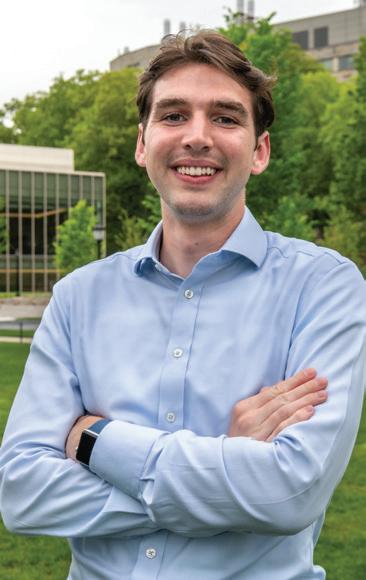
weeks on campus, my BC family started to assemble. Upperclassmen FLS mentors became my BC older siblings. Having dinner in a senior’s on-campus apartment is revolutionary to a freshman.”
“Fran’s enthusiasm for learning is so far above—and beyond—that I have no words for it,” according to Professor of the Practice of Business Analytics Stephanie Jernigan, who taught him in two classes and supervised one of his research assistantships. “He is motivated by boundless
curiosity, and more importantly, he infects others with his enthusiasm. It is such a generosity of spirit to not just excel, but to make those around him excel just a little bit more, too.”
The admiration is mutual: Hodgens’ favorite class was Jernigan’s Business Statistics, and he singles her out as a favorite professor.
“At BC, I found professors immensely approachable, and course syllabi frequently contain personal phone numbers, in case you want to grab coffee. I have been fortunate to use the Carroll School’s ‘Take Home Professor’ program to prepare a meal with my friends for our professors. Some of my warmest memories are laughing together around a dinner table.”
Hodgens holds the Carroll School’s Kevin M. Eidt Memorial Scholarship, awarded annually to a student who, over their first three years, demonstrated academic achievement, character, leadership, and school spirit similar to Eidt, who died in 1997 during his freshman year.
A popular Student Admission Program tour guide and panelist, Hodgens won praise from Associate Director of Undergraduate Admission Chris O’Brien. “As a leader in SAP, he has made a true impact. He is universally liked, respected, and definitely appreciated by all of us in Devlin. Fran will be missed.”
Hodgens also embraced BC’s ethos of service to others through involvement in community outreach programs. He was a volunteer instructor for English as a Second Language adult learners, and, through
a state grant, organized and implemented the FinFit Financial Literacy Program initiative for public schoolchildren in his hometown. During the summer of 2021, via a BC Advanced Study Grant, he completed an independent research project on the efficacy of property valuation systems in Greater Boston.
“BC’s Jesuit identity is the foundation upon which the rest of the school is built. BC is not a four-year job training program,” he said. “BC is a school where you live and grow alongside friendly, driven, and reflective classmates. It is impossible to leave BC without grappling with complex, challenging questions; you have to learn how to disagree constructively. Knowing when to change your perspective, when to double down, and why having an opinion matters are part of the experience that aren’t encapsulated in a single course or in a BC brochure.”
Asked what makes BC feel like home, he replied that “Everyone cares about you—whether it be your classmates, professors, administrators, alumni, or dining workers—and that feeling touches every piece of the BC experience. Although the student body is larger than the entire population of the town I grew up in, classes and clubs provide family-sized groups that foster a sense of purpose and belonging on campus.”
View an April 2024 Office of University Communications video of Hodgens at vimeo. com/901629000/533edebc03
A look at the 2024 Finnegan Award finalists, all of whom distinguished themselves through outstanding achievement inside and outside of the classroom, and their valuable contributions to the University and wider community.
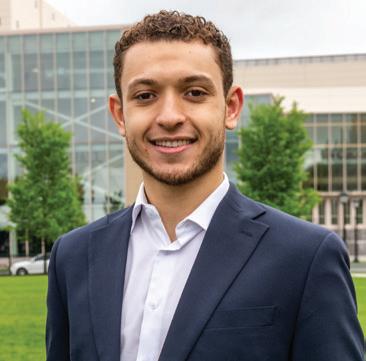
Mehdi Kayi, Morrissey College of Arts and Sciences
Major: Philosophy/Minors: Global Public Health, biology
Resident assistant; Winston Center for Leadership and Ethics Jenks Leadership Program, winner of its Joseph G. Bonito
Servant Leadership Award; Muslim Student Association; Medical Humanities Journal contributor; Massachusetts Department of Developmental Services mentor; Ronald E. McNair Postbaccalaureate Achievement Program; Bowman Scholar; Alpha Sigma Nu.
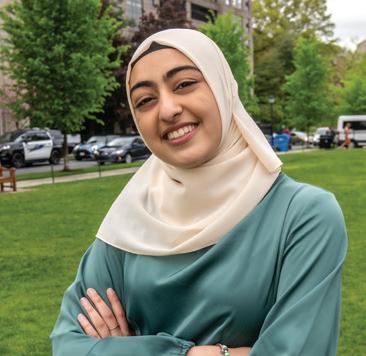
Zarah Lakhani, Lynch School of Education and Human Development
Majors: Transformative Educational Studies, Applied Psychology & Human Development/Minors: Design Thinking & Innovation, Management & Leadership
Student Admission Program tour guide and panelist; undergraduate research assistant; Design for ImpACCt mentor; spearheaded the startup Vitaliti to create a mold spore monitor, winning honors in various design competitions; Experience Reflection and Action peer mentor; founder and president of Care for Chemo nonprofit; BC Splash codirector.
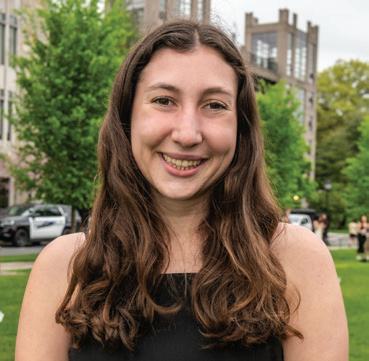
Undergraduate research fellow; BC Lean on Me; Taiwanese Cultural Club; CSON Keys to Inclusive Leadership in Nursing program; CSON Nursing Professional Development Seminar leader; Dana-Farber patient ambassador; Dominican Republic Nursing Service Immersion trip; Alpha Chi Chapter of Sigma Theta Tau International Honor Society of Nursing and “Spirit of Sigma” award winner.
May 23, 2024
Anna Laytham, Connell School of Nursing
FINNEGAN AWARD
Francis (Fran) Hodgens
photos by lee pellegrini
5 Chronicle
When She Was 5, She Wanted to Attend BC... ...Now
She’s a Graduate
BY SEAN SMITH CHRONICLE EDITOR
When she was five years old, Thalia Chaves stood on her tip-toes in a Boston College classroom so she could draw on the blackboard, and declared that, someday, this was where she wanted to go to school.
On Monday, Chaves stood tall at the Commencement Exercises in Alumni Stadium—only a few hundred yards from that classroom—as a member of the BC Class of 2024 recognized for her civic engagement activities, and experienced the additional joy of being the first in her family to graduate from college.
There are thousands of graduation stories among American colleges and universities every spring, many sharing similar themes, contours, and characteristics. But the commonalities are no less compelling, especially for those who live the tale.
Chaves—who majored in International Studies—is the oldest child of immigrants, neither of whom attended college but felt strongly that their children should have the opportunity. Her four years at the Heights had the ebbs and flows familiar to many undergraduates, and often shared by their families: anticipation; struggle and self-doubt; resilience and resolve; and ultimately, realization of one’s abilities, talents, and vocation.
“My acceptance to BC was one of my lightbulb memories with my parents,” said the Saugus, Mass., native earlier this month, as she and her parents, Elizete and Nelson, looked back on her BC years. “During my time here, I truly bought into the Jesuit motto of ‘cura personalis.’ Because of all my parents’ hard sacrifices,

I’ve tried to take advantage of every single opportunity available to me at BC. I had to leave here with everything I could to ‘set the world aflame.’”
The prelude to Chaves’s BC story was the odyssey of Elizete, a native of Brazil, and Nelson, who was born in the United States but spent almost all of his youth in Portugal before returning to the U.S. They met, they married, and just before Thalia was born decided to take a chance and started a flooring business. It took long hours and lots of energy, but sustained the family.
Nelson and Elizete’s flooring business had been working on numerous projects throughout BC’s campus in the 2000s. One sunny day, Nelson came to BC to check on his employees’ progress in one of the campus buildings, bringing along Elizete and five-year-old Thalia. Elizete and Thalia patiently waited in a Carney Hall classroom while Nelson spoke to his employees.
“I was very little then, but I do recall coming to campus,” recalled Thalia. “My
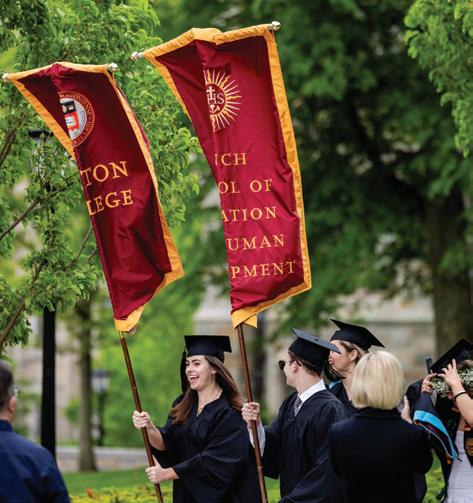
eyes were wide open. I had never seen such a beautiful place before.”
While they waited for Nelson to return, Elizete entertained her little girl. “I told Thalia that I had once taught kids who were about her age, and I began to write on the blackboard to show her what a teacher does. She came up to the blackboard and took a piece of chalk, and even though she had to stand on her tip-toes, she tried to write, too.”
Right about then, Nelson returned. “I saw Thalia writing, and kneeled down next to her and asked, ‘Do you want to come here to Boston College and study someday?’ She said, ‘Yes, I do!’”
Childhood pronouncements can easily be forgotten, and as Thalia grew older the memory of that day at Carney came up only occasionally and off-handedly. But when she began to consider colleges, BC was first on her list.
“It all just clicked for me,” said Thalia. “I went to Catholic schools throughout childhood, so that was a factor. But as I learned more about BC, I felt like this was where
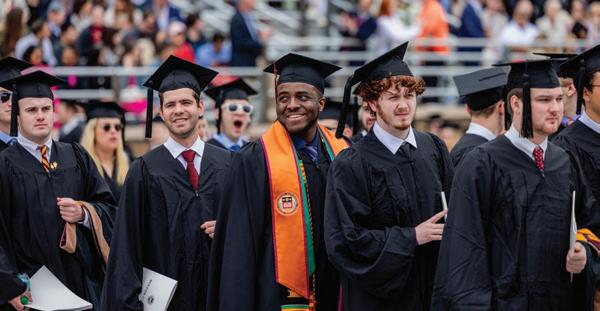
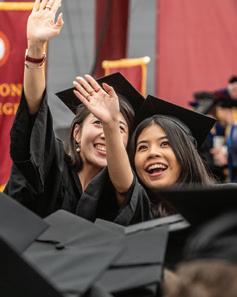
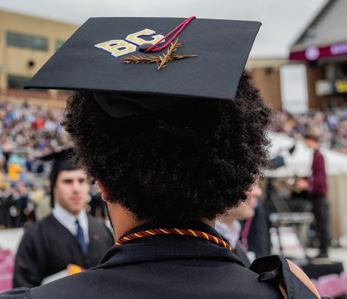
I needed to be, because it was all about educating the whole person, and challenging you in different ways. I thought BC would have many amazing opportunities that would help me get anywhere I wanted to go and help me discover who I am and what my place in the world could be. And of course, today I know it to be true.”
Her parents supported her desire. “With the right knowledge,” said Nelson, “you can do anything.”
Thalia is frank about the early part of her undergrad years. “I had ‘imposter syndrome,’ and was convinced I didn’t deserve to be here. I didn’t get the same good grades as I did in high school. I didn’t try as hard to get involved. I spent a lot of time in my room—my roommate actually moved out a couple of months in so I was by myself.”
Nelson and Elizete knew their daughter was having a tough time, and while neither had attended college, they saw something familiar in her ordeal. “I struggled being away from my family when I first came to America,” said Elizete. “It’s a difficult process to go through. We knew we had to be there for her, even just to listen.”
Living close to home helped, and Thalia could come home for a restorative weekend, said Nelson, “but in the end, she always went back to campus.”
Thalia hung in there, finding fulfillment in her classes, such as Perspectives, where she made friends (“Who are still friends,” she added) and found a mentor in Associate Professor of Theology Ronald Tacelli, S.J. She landed an internship in Dublin through the BC Office of Global Education, where she worked on housing provision systems reform in Ireland during the Ukrainian refugee crisis. Her self-confidence grew markedly.
Her parents’ emphasis on the importance of seeking community and opportunity helped motivate Thalia to work as program assistant for International Studies and on the leadership council for the Corcoran Center for Real Estate and Urban Action. The latter role was particularly meaningful to her because “it touched on all the things I’m most passionate about: access to opportunity, especially for less privileged people and sustainable communities.”
Her activities with the Schiller Institute for Integrated Science and Society directed Thalia’s gaze toward the future. She attended the COP27 climate change summit in Egypt and served as president of the institute’s Student Advisory Board, which helped her build an interest in climate change issues. Next month, she will start work at the Conservation Law Foundation; eventually, she plans to attend law school.
Thalia was surprised but gratified to learn that she had been selected for the University’s Ever to Excel Robert A. Sherwood Civic Engagement Award, which she received last month at a ceremony attended by her parents and younger brother.
“Winning the award felt like a comingfull-circle moment,” said Thalia. “I’d been active like that in high school, and though it took me a while, I was glad to find my way at BC. I think it’s something I can take with me.”
May 23, 2024
Thalia Chaves ’24 with her parents, Elizete and Nelson.
BC
Commencement
photo by lee pellegrini
Scenes
2024
6 Chronicle
PHOTOS BY LEE PELLEGRINI AND CAITLIN CUNNINGHAM
Fr. Olayo-Méndez Finds Issues with Use of CBP One App
Continued from page 1
derstanding of the asylum process—what happens when and what’s necessary to complete it—so they can be better prepared and not feel overwhelmed,” said Fr. Olayo-Méndez in a recent interview. “For that to happen, they need access to official, reliable information that is understandable, not in legal or technical jargon. The CBP One app has been continually updated and is light years better than what it was a year ago, but there is still much that needs to be done.”
The U.S. Customs and Border Protection launched CBP One in 2020, providing a single portal to a variety of CBP services to which users are directed through a series of guided questions. In January of 2023, the application became available for asylum seekers to submit biographical information in advance, request and schedule an appointment at an eligible port of entry in the southwest U.S. border, and begin the asylum process. There are eight such ports, at locations in California, Arizona, and Texas, with the infrastructure to admit people through CBP One.
Currently, CBP One appointments are limited to 1,450 every day, spread across each eligible port of entry. Appointments are available 21 days in advance, but due to the application’s utilization of geolocation software, migrants hoping to file for asylum in the U.S. can only schedule an appointment once they have reached central and northern Mexico.
Through the assistance of Jesuit Refugee Service USA and Jesuit Refugee Service (Mexico), Fr. Olayo-Méndez and a research team conducted 58 interviews with migrants in all the corresponding Mexican cities to the eight ports of entry. Every port was visited at least twice during the project. Fr. Olayo-Méndez collected data
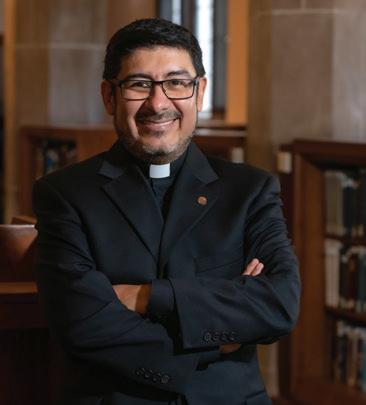
at 12 shelters and two informal camps in Mexico, and conducted 10 interviews with shelter directors and staff.
The researchers found that half of the interviewees felt “more secure” having a cell phone, and their most common sources of information about CBP One and crossing into the U.S. came from social media and word of mouth from personal networks or trusted social ties. Only a fourth felt the information they received about the asylum process is reliable. WhatsApp, Facebook, Facebook Messenger, and YouTube were their most-used digital platforms. Although a majority of the respondents said they knew “a little” about CBP One before starting their journey, about a fourth said they knew “nothing.”
About a third of the interviewees had been waiting at least three to six months for a CBP One appointment; almost a fourth one to three months.
Fr. Olayo-Méndez pointed out that, due to changes and policies, some people are dropped from CBP One registrations without their knowledge and must start over again, even after having waited for several months.
“The problem is not so much the app, but the process of presenting oneself at the border and the lack of accessible information available to people,” says Asst. Prof. Alejandro Olayo-Méndez, S.J. (BCSSW). photo by lee pellegrini
“The problem is not so much the app, but the process of presenting oneself at the border and the lack of accessible information available to people,” he said. “People get to know what CBP One is along the way through news or through word of mouth. But they only know that there is an application that provides an appointment to enter the U.S.”
Furthermore, migrants need a mobile phone that can handle the latest update of CBP One to schedule their meeting, operate on different social media platforms, and work on high-speed Internet. Another challenge is to find places to charge the phone, which puts a burden on migrant shelters because it requires setting up systems and outlets to allow a large number of people to do so.
In addition to assessing migrants’ respective familiarity with and use of digital technology, including CBP One, Fr. Olayo-Méndez and his team also asked about their motivations for migrating, encounters with violence at home, and experiences during the migration journey. Some individual anecdotes and comments are featured in the report.
“They are not only fleeing violence, or the threat of being killed, but in some cases because their children are being recruited by cartels or gangs,” he said. “For them, there is no choice but to leave, despite what they have to endure on the journey.”
Already coping with physical and mental health issues when they arrive at shelters, said Fr. Olayo-Méndez, many of the migrants then undergo the stress and anxiety of waiting for an appointment to enter the U.S. and start the asylum process.
The report lays out a series of recommendations, including: ensure access to reliable, accurate information on the asylum process and using CBP One, while providing timely, relevant information about the CBP One process and outcomes; increase CBP One appointments to at least 5,000 a day and robustly fund efficient, consistent processing operations; hire more asylum officers and immigration judges, and fund programs to support asylum-seekers during the legal process; fund programs that support border and destination communities receiving migrants; coordinate with regional partners, NGOs, and civil society to ease protection concerns and eliminate misinformation.
The advent of smartphones has had a major impact on migration, said Fr. Olayo-Méndez, and such devices have become essential for people in search of refuge in the U.S.
“But the need of a smartphone has other consequences that puts a burden on people seeking asylum and those humanitarian organizations that support them when they are in vulnerable positions.”
The report is available at bit.ly/BCSSWmigrants-digital-practices
University Continues to Make Gains in Sponsored Research
Continued from page 1
“There has been an intentional plan on the part of the leadership of the University,” said Vice Provost for Research and Academic Planning Thomas Chiles, who is also the DeLuca Professor of Biology. “First and foremost, we have invested in our faculty and they are the ones who make this happen.
“This is our mission. We strive to benefit the common good. You can see the research taking place at Boston College having an impact in real time in the world. You can see interventions developed by social scientists or education scholars. You can see our researchers in the natural sciences creating a greater understanding of our physical world. We are having an impact from every corner of the University. It is a very rewarding and exciting time to be here.”
Aligned with the priorities of the University’s strategic plan, investments have been made in office, classroom and lab space, equipment and technology, and support services for researchers, Chiles said—all of which have expanded research
capacity, retained experienced scholars, and attracted stellar new faculty.
“We have invested in our faculty and I think the caliber of the faculty across the University is the highest it’s ever been,” said Chiles. “We are competing with the top universities to attract and retain outstanding scholars. You do that by developing a supportive infrastructure, capital funding, facilities, and competitive salaries.”
Faculty, graduate students, and postdoctoral researchers all contribute to the experience of BC undergraduates, Chiles said. “When you layer onto our research the hungry, young minds of our students, engage them in faculty research, see them grow, then move on to make their own impact, that is very exciting.”
BC has made an approximately $300-million investment in the sciences, which includes the construction of 245 Beacon Street, which opened in 2022— home to the new Human-Centered Engineering Department, rapidly growing Computer Science Department, and the new Schiller Institute for Integrated Sci-
ence and Society. In the liberal arts, BC opened Stokes Hall in 2013, now a focal point of humanities scholarship.
The Provost’s Office has also supported high-impact research through its IGNITE and RADS internal grants programs, designed to foster collaborative projects to advance ideas and projects that could one day compete for funding from agencies like the National Science Foundation or the National Institutes of Health, as well as private foundations.
Chiles cites the award of multiple MIRA grants from the NIH as an example of the increasingly high caliber of research being conducted at BC. University faculty currently hold 11 MIRA awards, seven of which were awarded to Chemistry faculty.
“The continued successes of our colleagues in winning competitive awards such as MIRA from the NIH speak of the strength of our faculty,” said Chemistry Department Chair Dunwei Wang, the Margaret A. and Thomas A. ’53 Vanderslice Professor of Chemistry. “This wouldn’t have been possible without strong research
support from the Office of Sponsored Programs, the Provost’s Office, and the Morrissey College of Arts and Sciences service centers. Successes like this are critical in placing BC as a leader in scientific research.”
Ferris Professor of Physics Michael Naughton, who was recently awarded a $750,000 grant from the Mathers Foundation to investigate a new radiation therapy with clinicians at Yale Medicine, said it has been exciting to watch BC’s research profile rise.
“As both an active researcher and a prior vice provost for research, I’m thrilled to see how the University’s research enterprise continues to grow,” said Naughton. “I see it as a further indication, and indeed a major driver, of BC’s increased stature as an internationally-recognized university. It shows that recent strategic investments in research-intensive areas, and in the excellent faculty that were and continue to be recruited, are paying off.”
May 23, 2024
7 Chronicle
University Honors Retiring and 25-Year Employees
University President William P. Leahy, S.J., will host the annual Recognition Reception and Dinner for retiring Boston College employees on May 29, which also will include presentation of the annual Boston College Community Service Award to Connell School of Nursing Associate Dean M. Colleen Simonelli.
Those administrators, faculty, and staff who retired during the 2023-2024 academic year are: Laura Bitran, Margaret Bligh, Brian Braman, Hiram Brownell, Susan Bruce, Patricia Bryant, Laura Campbell, James Casey, Daniel Coquillette, Wayne Daley, David Deese, Donna Derosa, Mary Kathleen Dunn, Pierre Foy, Kimberlee Gardner, Joanne Goggins, Laura Hall, Paul Harvey, Paul Hiles, Mary Ann Hinsdale, Clifford Holderness, Karen Hughes, Deborah Jasset, Marilynn Johnson, Christine Kamp Cichello, Enid Karr, Thomas Kelly, Sandra Laino, and Maureen Lamb. Also, Frederick Lawrence, Ernesto Livon-Grossman, M. Brinton Lykes, Mary Magennis, Joyce Mappes, Brenda McCormack, David McCormack, Ellen McDonald, Judith McMorrow, Andrea Morahan, Ina Mullis, Mary Ann Neary, Susan Noonan, Brian O’Connor, Michael Resler, Elizabeth Rhodes, Margery Richardson, Harvey Roberts, Kathleen Rosa, Kay Schlozman,
Dennis Shirley, Kevin Simard, Howard Singer, Gerald Smith, Edward Stokes, Sheryl Sullivan, Robert Thompson, Nham Vu, and Stanley Zatkowski.
On April 30, Boston College recognized employees who completed 25 years of service during 2023-2024: Deborah Aaron, Maura Adams, Christopher Bove, Lawrence Busenbark, Jenny Chinsen, Lisa DiPietro, Gemma Dorsey, Jack Dunn, Andrew Eschtruth, Patricia Favreau, Henri Hajj, Robert Herbstzuber, Nathaniel Kenyon, Joanne LaRosee, Linda Malenfant, Margaret McCorkle, Carolyn McLaughlin, Susan Migliorisi, Purna Mukherjee, Sean Murphy, Christopher O’Brien, Carlos Sangurima, Laurene Spiess, Dao Thach, and Lance Tucker.
Also, Dora Adar, Aleyda Castillo, Lois Kass, Charles Lafontant, Amelio Lopez, Elizabeth Argueta, Leigh Butera, John Baldovin, S.J., Martin Bridgeman, Mary Ann Chirba, Martin Cohen, Gerald Easter, Lisa Goodman, Nanci Haze, Hideo Konishi, Uzi Segal, Susan Shu, Andrew Sofer, Crystal Tiala, David Wirth, Manuel Martins, Nicholas Mastropoll, Scott Schipper, Kari Lee Evans, Mary Magennis, Michael Edward McGrath, Chienru Wang, and Melissa Wong.
—University Communications
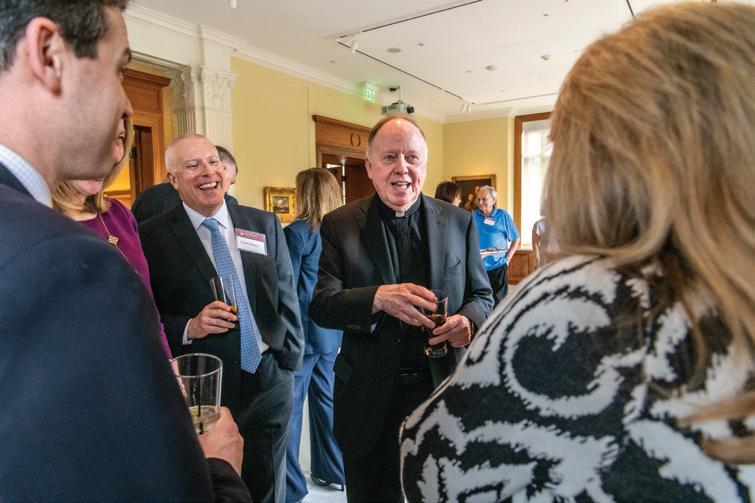
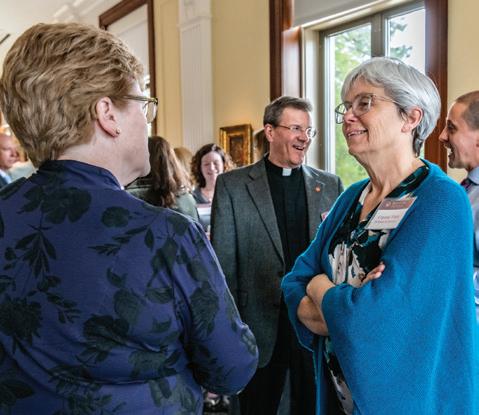
PARTING THOUGHTS
Retirees Look Back on Their BC Years
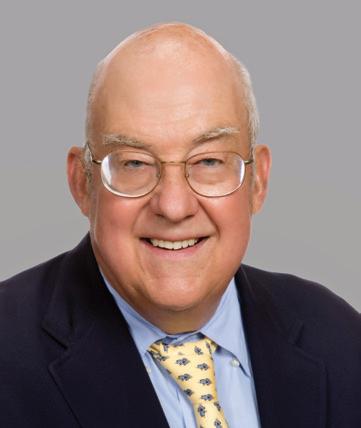
Daniel R. Coquillette
Joined BC in 1984
J. Donald Monan, S.J. University Professor; dean of Boston College Law School from 1985-1993; credited with guiding the law school into the ranks of the nation’s top 25, securing firm financial and enrollment footings, and nurturing a spirit of faculty collegiality.
“The most obvious change I have witnessed in my 40 years at BC has been the extraordinary improvement in the physical plant, including on-campus housing for nearly all undergraduates, the new library and East Wing at the Law School, the spectacular 245 Beacon Street science building, and the Connell Recreation Center, where I can often be found swimming laps. But even more important has been the steady progress of the University, both in terms of academics and in the composition of our wonderful students, staff, and faculty. What was a strong University when I arrived in 1984 is now a great University.”
Brian Braman Joined BC in 1992 Professor of the Practice, Philosophy Department; Perspectives Program director for 21 years; author of Meaning and Authenticity: Bernard Lonergan and Charles Taylor on the Drama of Authentic Human Existence, numerous book reviews and journal articles; winner of Phi Beta Kappa Teaching Award, Boston College Excellence in Teaching Award, Mary Kaye Waldron Award, Outstanding Collaboration Award.
“Boston College has become more nationally and internationally known. In addition, the University continues its commitment to true liberal arts education in the tradition of Jesuit education. There is a stronger commitment to formative education that takes seriously that human beings are orientated to mystery and transcendence. And finally, all of this can be placed under the rubric of cura personalis.”
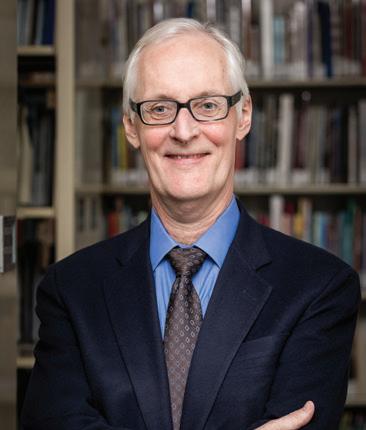
Dennis Shirley
Joined BC in 1998
Lynch School of Education and Human Development associate dean; inaugural Gabelli Family Faculty Fellow; authored or co-authored 10 books on the history and politics of education; editor-inchief, Journal of Educational Change; co-launched new Lynch School Department of Formative Education.
“The most significant transformation I observed at Boston College throughout my career has had to do with the increasing level of academic rigor, philosophical sophistication, and interdisciplinary collaboration. When I came to the Lynch School, it was relatively isolated from other BC units; that situation has been completely overcome to the benefit of the entire institution. I’m grateful for the many ways that strong leadership, inspired collegiality, and genuine intellectual openness have promoted this felicitous development and enriched the free exchange of ideas across all disciplines.”
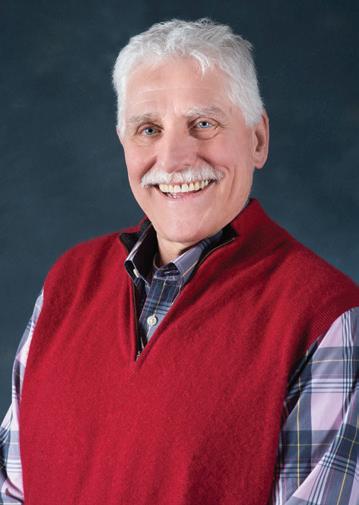
May 23, 2024
photo by martha stewart photo by caitlin cunningham
photo by peter julian
Above, University President William P. Leahy, S.J., congratulated administrators, faculty, and staff who completed 25 years of service to Boston College, at a reception held on April 30 in 2101 Commonwealth Avenue. At right, Professor of Theatre Crystal Tiala chatted with Associate Vice President for Advancement Operations and Planning Brenda Ricard.
8 Chronicle
photos by lee pellegrini
Michael Resler
Joined BC in 1976
Served as German Studies chair, playing major role in department’s success in helping German Studies majors earn Fulbright grants—including 13 in 2007 alone; founding director of the University Fellowships Program; earned University’s Phi Beta Kappa Teaching Award in 1997; earned Order of Merit of the Federal Republic of Germany.
“I was just 27 years old when, armed with a freshly minted doctorate, I was hired to teach German at Boston College. The Germanic Studies Department (as we were called back then, even though the only ‘Germanic’ language we ever taught was German) was over-tenured, so it was made clear to me from the outset that, as an adjunct assistant professor, my ‘visit’ at Boston College would be a short one—six years max, and maybe a seventh, but only if I’d sign away any claim to tenure.
“Forty-eight years later, things have turned out rather differently, to my immeasurable good fortune.
“In those early years, most students had Irish-sounding names. Now they’re from so many far-flung corners of the globe that it’s often a challenge to pronounce their names correctly. But then again, I’m reminded that even those Irish names weren’t always guaranteed to be easy either: I’ve had several Siobhans and even a Niamh over the years. Sometimes what seems ‘foreign’ is fundamentally not all that different from what’s most familiar.
“When I first started here, I could’ve been an older brother to my students. In fact, several times when I was walking across campus in those early years, I was pulled aside and urged to vote for this or that candidate in the UGBC elections. More recently, I was appalled when one of my former students, now a decadeslong friend, reminded me that he’s in his mid-60s. At this point, I could actually be a grandfather (though sort of a youngish one, as I’d like to fool myself) to my cur-
Laura Bitran
Joined BC in 1995
Staff assistant, Office of Governmental and Community Affairs; led the Read Aloud Program, which sends BC volunteers to read in local school classrooms; helped coordinate Boston College Community Service Award, Allston-Brighton/ Boston College Community Fund, and community cultural events and programs for local residents.
“When I joined the Office of Community Affairs, I learned about the role that this workplace played among the Boston College constituents and how relevant my interaction with them was, including my relationship with other associates, co-workers, and students. I was proud to have become a member of this University—embracing a new undertaking was always exciting and challenging. I was getting involved with campus wide-projects, like the Community Service Award, Neighborhood Night at the Theater, Pops on the Heights, and others, but my allegiance was funneled into the Boston College Read Aloud Program.
“A few months within my initiation in
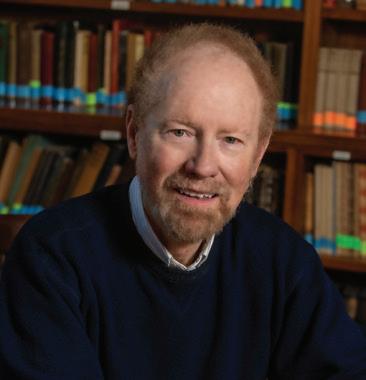
rent students. From brother to grandfather: In between, so many of my most cherished life-gifts have been cross-generational friendships with former students and their families. And as a married gay man, I’ve twice been deeply touched when former students—both of them straight—asked me to officiate at their weddings. Absolutely inconceivable, on so many different levels, back in 1976.
“Over this long stretch of years, I’ve watched—and as I’d like to imagine, have perhaps contributed in some small ways— as Boston College has emerged from its status in 1976 as a mostly regional college into a preeminent university of truly international stature. Though so many of the externals have changed over this nearly half-century, what’s remained astonishingly constant and unchanged is the fundamental goodness and decency of the people. And that includes all the people: One of my saddest moments in recent times came when I attended the funeral of our longtime custodian in Lyons Hall.
“As anyone reading these words already knows, we are inexpressibly fortunate to be members of this welcoming, friendly, and caring fellowship called Boston College. Which is exactly why I hope to teach an occasional course over the coming years, so as to prolong my own ‘visit’ to this wonderful community.”
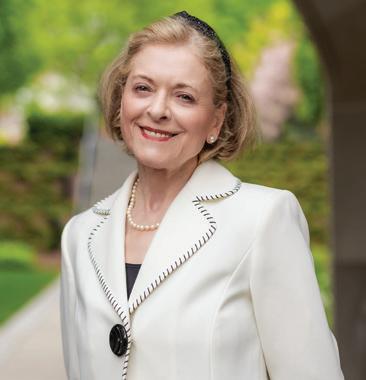
the office, I was asked to coordinate and nurture this project that comprised just about eight people at the time. As the years passed, Read Aloud became a ‘community service magnet’ for countless staff and faculty members. We have served the parochial St. Columbkille School and Thomas Edison, a public school, both located in Brighton. For a large number of academic seasons, we estimated an impressive number of over 60 members, and some of those readers are still counted today as
Kay Schlozman
Joined BC in 1974
J. Joseph Moakley Professor of Political Science; first woman selected for the American Political Science Association
Warren E. Miller Lifetime Achievement Award; co-author of six books, including Unequal and Unrepresented: Political Inequality and The People’s Voice in the New Gilded Age
“When I arrived at Boston College in 1974, course syllabi with smudgy, purple type were produced on mimeograph machines. Large numbers of undergraduates lived with their parents and commuted to campus. The most popular major was English. My median grade in those days was somewhere between a B-minus and a B. My male colleagues in the Political Science Department all wore coat and tie in the classroom. I cannot report on what the other women in the department wore because there weren’t any.
“By and large, the substantial changes at BC that I have witnessed in the half century reflect larger processes that have transformed the nation. Those who remember making collect long-distance calls or delivering a paper copy of semester grades to the registrar will not be surprised that the most obvious change is the revolution in technology, which has had implications for how faculty conduct research; how we plan our classes and communicate in the classroom; how students prepare for class, research their papers, and submit assignments; how they access entertainment; and how they communicate with each other, with their families, and with us.
“In March 2020, faculty learned that ‘Zoom’ is not just a synonym for ‘to go speedily.’ Pivoting quickly, we learned a new technology and labored to deliver a meaningful educational experience to widely scattered students who were logging in from their parents’ basements. How could we possibly have managed a pandemic a few decades earlier?
“Other changes in the nation that are reflected on campus are the increase in immigration and the opening of American institutions to previously excluded groups. Like the American population, the Boston College community—students, faculty, and staff—is much more diverse than it once was on a variety of dimensions, in particular on the basis of race and ethnicity. While Boston College retains its deep Jesuit and Catholic ties, another American trend that is manifest on our campus is increasing secularism. Americans—and our
fundamental contributors to the program.
“Recognized by many of our participants, a fringe benefit of the Read Aloud has been the sense of community within the schools, the precious interaction with the children and their teachers, and the camaraderie among the fellow volunteers. The program has been promoted and generously supported by Human Resources, under Vice President David Trainor and Assistant Director Suzanne Lawler.
“Read Aloud has become our own fabric of life among many of our activities. Working with young students of all ‘walks of life’ offers a sense of perspective and renewal. Together, we have paved the way toward
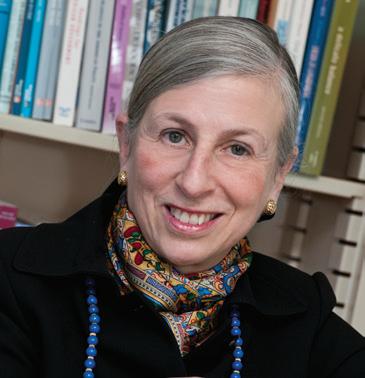
students, who mostly come from Catholic backgrounds—are less likely to attend religious services than in the past.
“Parenthetically, I might mention a change in the composition of Catholic families. I have made a practice of making appointments with students to come to my office at the beginning of the semester for an informal get-acquainted session. In my salad days on the faculty, a student might mention, ‘I am the third of 11 children.’ I have not heard that in a long time.
“Over the decades, Boston College has changed in other ways that have nothing to do with trends in the surrounding society, evolving from a regional university to a national one. In 1974, 53 percent of the freshman class hailed from Massachusetts, compared to 20 percent of this year’s entering first-year class. Average SAT scores for the 1974 freshmen were 515 Verbal and 548 Math. The analogous figures for the class of 2023, the last class to apply before BC became test optional, were 692 and 721. In short, students are now more talented and are recruited on a national basis.
“With regard to scholarship, the faculty has become more productive and includes more colleagues with national reputations. In 1974, the university was emerging from a financial crisis and had an endowment of a few million dollars. Today, it is nearly $4 billion. In a word: BC has gotten better.
“Fortunately, some things have not changed. The staff continue to lead off any encounter by asking, ‘How can I help you?’ The University continues to take undergraduate education seriously and interprets its educational mission in terms of educating the whole person. The students continue to be a pleasure to teach: curious, respectful, engaged, women and men for others. May these defining aspects of Boston College long endure.”
improving literacy, one of the most essential staples to foster a healthy generation of youngsters who will, hopefully, make the right choices and aspire to their future leadership roles.
“As I retire, I take this moment to contemplate the impact that all the members of this program have made in the countless classrooms, one page, one story, one reading at a time. I also reflect on all of you—administrators, school teachers, and past and present Read Aloud friends—and I thank you for your unselfishness and remarkable presence in the lives of the children of our world.”
May 23, 2024
photo by caitlin cunningham
photo by lee pellegrini
9 Chronicle
photo by lee pellegrini
University Honors Grads Preparing for Service Work
BY AUDREY LOYACK STAFF WRITER
Members of the Class of 2024 who have committed to full-time, post-graduate service work were honored on May 10 by Boston College’s Volunteer and Service Learning Center (VSLC) at a celebration on the back lawn of the Hovey House.
Some 25 graduates attended the annual event, each of them bringing along one person—faculty, staff, or fellow student— who they felt strongly supported them during their discernment process. As a tradition, those attending the reception gather in a large circle, where the graduates-to-be talk about their upcoming volunteer experiences, and guests of the honorees contribute words of encouragement.
VSLC Associate Director Kate Daly called the event “a great opportunity for students to share their plans and to hear what other peers are up to as well.” Many of the 66 volunteer organizations listed on the VSLC’s website are represented at BC’s Post-Grad Volunteer Fair that takes place every fall at the beginning of the academic year. Still, she noted, there are usually several organizations that tend to be most popular among students, such as the Jesuit Volunteer Corps (JVC), Amate House, St. Joseph’s Worker Program, Red Cloud Indian School, and the Peace Corps.
One such JVC volunteer is Max Manalang ’24, whose mother worked for
OBITUARY
John Boylan Jr.; Lab Manager Found Spiritual Side at BC
John G. Boylan Jr., a retired Chemistry Department staff member whose encounter with spirituality at Boston College transformed his life and career, died on May 9. He was 73.
A requiem Mass will be said for Dr. Boylan on Saturday at 10 a.m. in All Saints Episcopal Church, 209 Ashmont Street in Dorchester.
Dr. Boylan joined the Chemistry Department in 1992 as manager of its newly operational Nuclear Magnetic Resonance Laboratory in the Merkert Center. For the first five years of his tenure at BC, he mainly focused on the lab’s operations and teaching graduate students to use the facility.
“I have always been very consumed with my career in science,” explained Dr. Boylan in a 2003 interview with Boston College Chronicle. “I had always sort of knuckled down on my career path.”
That changed as Dr. Boylan began to take notice of BC’s activities and programs geared to exploring faith, and in particular in 1997 when he went on a retreat for the Ignatian Spiritual Exercises—a compilation of meditations, prayers, and contemplative
the same organization when she was his age. JVC’s mission is to connect with local communities to foster “the formation of young people dedicated to a faith that promotes justice.”
“JVC changed my mom’s life,” said Manalang, whose placement is at Philadelphia VIP, which connects people with low incomes to pro bono legal services. “She’s still best friends with all of the people she volunteered with. She was so happy when we found out I was going to be doing the program that she reached out immediately to tell all of them.”
Manalang, who attended a Jesuit high school, said his four years at BC majoring in economics and philosophy instilled strong Jesuit values in him that inspired him to pursue full-time volunteer work: “BC has taught me how to be a man for others beyond my college years.”
Standing beside Manalang at the reception was Margaret Doheny ’24, who earned a bachelor’s degree in economics and theology and will work with JVC Northwest in Boise, Idaho.
“Max’s connection to JVC is much more sentimental than mine,” she said, “but the influence of service around me at BC has had a very powerful effect on me. It’s as simple as that.”
John Clark ’24 signed on with the Alliance for Catholic Education (ACE) as a teaching fellow and this summer will begin his two-year stint as American and global
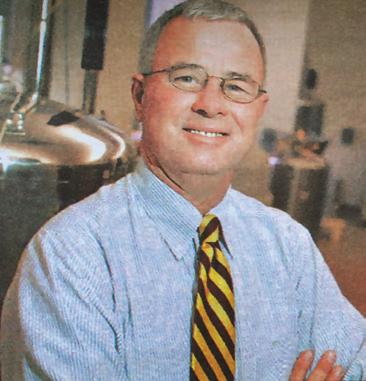
practices developed by St. Ignatius Loyola to help people deepen their relationship with God. He went on to help direct the retreat for four years.
Another turning point was in 1999 when, still looking for ways to connect with the larger community at BC, Dr. Boylan enrolled in the Ignacio Volunteers program and wound up leading a group of 15 students on a work project at a shelter for homeless migrant workers in Mexico, undertaking various assignments from preparing meals to visiting youth detention centers and prisons.
“It turned out to be a really life-changing experience in a number of ways,” recalled Dr. Boylan, “not only from my own perspective of service, but also in terms of the connection I was able to make with
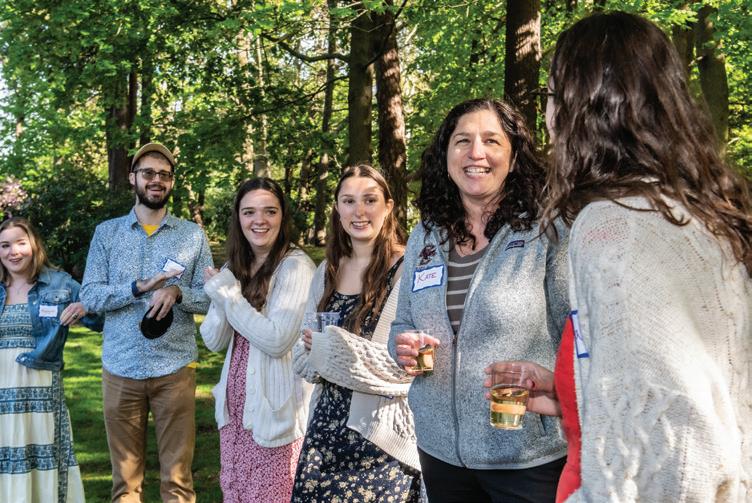
history teacher at a Catholic high school in Anaheim, Calif. In addition to his family and Catholic education, he cited his participation with 4Boston and Appalachia Volunteers as formative factors during his time at BC.
“I knew I wanted to be a part of a post-grad service program, especially one committed to education, community, and spirituality,” said Clark, who majored in political science. “As someone who has had incredible teachers and mentors growing up, I hope to be that same figure for my students next year.”
students—a very different connection than I had here in the laboratory.”
Two years later, when he took a group of Ignacio Volunteers to a small village in Belize, brought another life-changing event. He met Rosebelle, a young girl who had just graduated from elementary school, but had little in the way of family relationships and was unable to go on to high school. When the principal of Rosebelle’s school asked if there was any way the group might be able to help her, Dr. Boylan and his wife, Rebecca, agreed to support her financially.
“She’s a marvelous young girl, very engaging,” he said. “We have made a couple of trips down on our own to visit her. Rosebelle has become very dear to us.”
In fact, Dr. Boylan had met Rebecca because of his spiritual awakening. About a year after his introduction to the Spiritual Exercises, Dr. Boylan began volunteering one evening a week at Rosie’s Place. Since his volunteer shift at the shelter coincided with that of BC students in the PULSE program, he wound up shuttling them to and from campus in the PULSE van. Rebecca also was a Rosie’s Place volunteer and sat on the board of directors. As Dr. Boylan recalled, “They sort of fixed us up.”
In June of 2002, the two were married in Gasson Hall. The flower girls were from the couple’s neighborhood church and among the wedding guests were Belize residents who had flown in for the occasion.
Dr. Boylan found other ways to engage with the BC community, such as co-leading
In a short speech that wrapped up the celebration, Daly commended the future graduates for the “counter-cultural and unique” experience on which they are about to embark. “These are challenging and exciting times ahead of you, and know that the VSLC is here to support you well after your volunteer years.”
Established in 2003, the VSLC assists members of the University community in seeking part- or full-time volunteer opportunities on campus or in the Greater Boston area. The center’s website is bc.edu/ vslc.
a course in the University’s Capstone program, Decisions for Life, and another in the Perspectives IV program, New Scientific Visions. He also served on the BC Martin Luther King Jr. Memorial Committee and co-facilitated diversity awareness sessions for faculty, staff, and administrators.
In recognition of his various outreach activities, both on campus and far away from it, Dr. Boylan received the 2003 Community Service Award.
“Wouldn’t it be great if everything in life was so easy,” he mused on being presented with the award, “to be recognized for doing those things that really animate you, the things that you love to do, and being with the people that you love to be with?
“This is a part of the Boston College community that I value: the ideals around service—and to be a part of that is a great honor.”
Dr. Boylan earned a degree in biology from St. Louis University and a doctorate in chemistry from the University of Missouri. He completed postdoctoral study in chemistry at Boston University Medical School prior to arriving at BC.
He retired in 2016.
Dr. Boylan is survived by his wife, Rebecca (Petty) Boylan, and his sisters, Nancy Thomas and Deborah Boylan; he was predeceased by his sister, Elizabeth St. Angelo.
In lieu of flowers, donations in memory of Dr. Boylan may be made to All Saints. —University Communications
May 23, 2024
photo by gary wayne gilbert
Volunteer and Service Learning Center Associate Director Kate Daly (second from right) talks with members of the Class of 2024 committed to post-graduate service work, at a May 10 reception held in their honor. “The influence of service around me at BC has had a very powerful effect on me,” said one graduate. “It’s as simple as that.”
photo by lee pellegrini
10 Chronicle
Michael Smyer; Was First Associate VP for Research
Michael A. (Mick) Smyer, a pioneer in geriatric mental health who served as dean of Boston College’s Graduate School of Arts and Sciences (GA&S) for 13 years, died on May 3. He was 73.
He also was the University’s first associate vice president for research and co-founded the BC Center on Aging and Work during his tenure at the Heights.
Dr. Smyer came at a critical juncture in the University’s academic and administrative history when he arrived in August of 1994, as BC graduate programs in nursing and education shifted from GA&S to the schools of Nursing and Education. In addition to inaugurating the position of AVP for research, two months into his first semester he was named co-chairman of the University Academic Planning Council (UAPC), a major long-term initiative to shape Boston College’s academic life into the 21st century.
In a January 1995 interview with Boston College Chronicle, Dr. Smyer was upbeat about the challenges posed by multiple leadership roles, noting that he had held a similar position at Pennsylvania State University’s College of Health and Human Development before coming to BC.
“I think of the issue as teaching and research, not teaching versus research. I truly think each complements the other. If faculty members are fundamentally excited by what they do, they bring it to all areas of their profession.”
He also pointed to research as a tremendous opportunity for graduate education to make an impact beyond academia. “A number of industrial areas are cutting back the resources formerly devoted to research. To fill their needs, they will be looking to universities for graduate students with advanced degrees, or for partnerships. BC should be involved in areas where we can make a difference and that speak to our
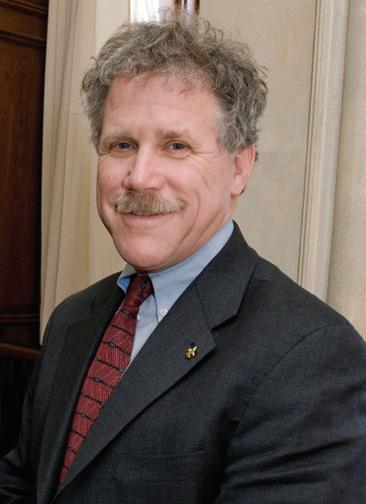 photo by lee pellegrini
photo by lee pellegrini
mission.”
Ten-and-a-half years later, when Dr. Smyer stepped down as AVP—retaining his role as GA&S dean—the University had doubled the amount of external funding to $40 million, which he said had greatly increased the research activity on campus. But a raft of complex issues facing academic research, such as intellectual property and the use of human subjects, had made it necessary for BC to consider hiring a full-time research officer, he explained.
John Neuhauser, then academic vice president and dean of faculties, praised Dr. Smyer’s performance as AVP, reported Chronicle. “He’s done a tremendous job, and the numbers alone testify to that. But Mick has definitely been instrumental in creating the climate for research at BC. The University’s success is a tribute to his encouragement.”
Dr. Smyer’s involvement in the UAPC and its 18-month study of BC’s long-term
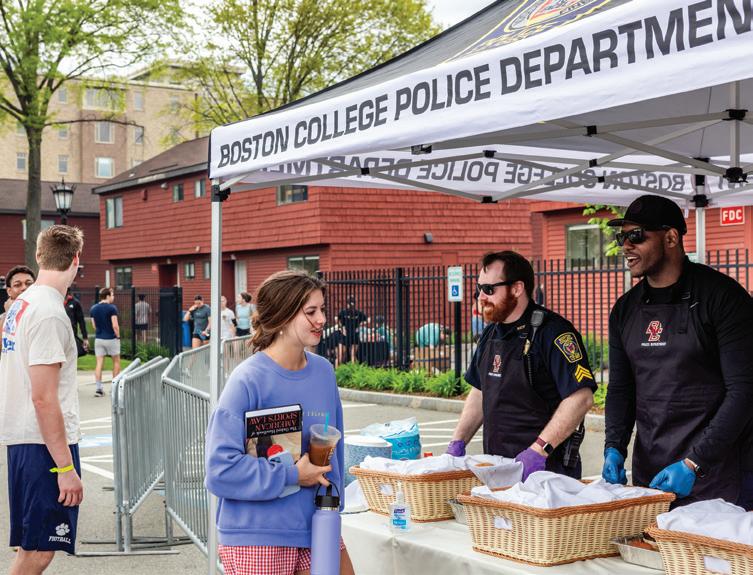
academic mission, meanwhile, produced the 1996 report, “Advancing the Legacy: The New Millennium.” The document outlined five goals: strengthening support for professional and graduate education; affirming research as central to the University’s mission; emphasizing BC’s Jesuit liberal arts education tradition; stressing rigorous intellectual development and personal formation as characteristic of BC’s undergraduate education; and proposing diversity, technology, and internationalization as distinctive features of the BC environment.
For all his administrative work, Dr. Smyer remained active as an awardwinning psychologist in geriatric mental health from the time it emerged as an organized field. Among his foundational contributions was in co-establishing the Center on Aging and Work at BC in 2005 to promote opportunity, choice, and quality of paid and unpaid work across the lifespan, with a focus on older adults. One of its earliest projects was a study of how the American workplace might evolve to accommodate its aging workforce—a weighty question posed by the aging of the baby boom generation.
“One thing that can affect older workers’ decisions about work that is often overlooked is the availability, or lack of availability, of flexible work options,” he told Chronicle. “Our work will focus on the study of working flexibility because it is a particularly important element of innovative employer responses to the aging workforce.”
Since its founding, the center has produced hundreds of fact sheets, case studies, comparative policy summaries, policy
Jobs
The following are among the recent positions posted by the Department of Human Resources. For more information on employment opportunities at Boston College, see www.bc.edu/jobs or scan the QR code at right.
Assistant to the Dean for Strategic Initiatives, Clough School of Theology and Ministry
Records Assistant Data Management
Associate Vice President for Major Giving
Law Library Assistant
Assistant Director for Institutional Research
Associate General Counsel
Assistant Dean, Student Conduct
Resident Director
Temporary Office Pool
Food Service Worker
Public Safety Dispatcher
Academic Support Assistant
Liaison Librarian for Health Sciences and Biology
briefs, and research reports; embarked on studies about the health, mental health, and quality of life of the aging workforce in the United States and around the world; and produced translational research products to aid efforts to adapt to shifting workforce age demographics.
After leaving BC, Dr. Smyer was provost of Bucknell University from 2008 to 2015, retiring from his academic career there as professor of psychology in 2020. A native of New Orleans, he earned a bachelor’s degree in psychology from Yale University and a doctorate in clinical psychology from Duke University. He joined the Penn State faculty in 1977 as an assistant professor and from 1998-1992 was associate dean for research and graduate studies at Penn State’s College of Health and Human Development.
Dr. Smyer’s book, Aging and Mental Health, co-authored with Daniel Segal and Sara Qualls, was regarded as an important resource in the field of gerontology. He was recognized with the M. Powell Lawton Award for Distinguished Contribution in Clinical Geropsychology from the Society for Clinical Geropsychology; and an American Psychological Association Citizen Psychologist Presidential Citation. He was awarded Fulbright fellowships to Japan and India and held an appointment as Civic Innovation Fellow at Stanford University’s Hasso Plattner Institute of Design.
He is survived by his wife, Pat PiperSmyer; his children, Brendan Piper-Smyer and Kyle Piper-Smyer; and four grandchildren, three nephews, four nieces, four grand-nephews, and a grand-niece.
—University Communications
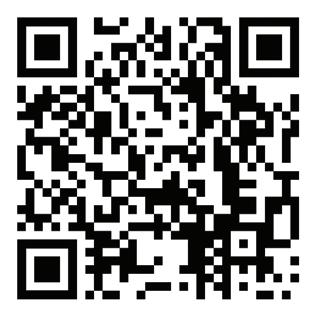
Concert Manager
Dishwasher
Special Education Teacher
Director, Human Neuroscience Facility
Police Officer
Associate Director, Student Financial Systems
Consulting Dietician, Pediatrics
Assistant Coach, Women’s Ice Hockey
Director, Sponsored Programs
Postdoctoral Research Fellow (multiple positions)
May 23, 2024
OBITUARY
The Class of 2024 celebrated Senior Week on Lower Campus at a barbeque on May 15, hosted by the Boston College Police Department.
11 Chronicle
photo by caitlin cunningham
Five Decades On, Fishman ‘a Champion’ at BC
For her Lifestyle Journalism course, Isabel Potter ’24 wrote a profile of Donald Fishman, a Communication faculty member who has taught at Boston College for five decades. Her piece has been adapted and edited for Chronicle
Warm, caring, generous, significant, hardworking, humorous, genuine, smart, mensch, Obi-Wan Kenobi of BC Communication, heart and soul of the department, forward-thinking, steadfast, friendly, good person.
Associate Professor Donald Fishman, wrapping up his 51st year on the Communication Department faculty, has earned every such accolade, according to his colleagues and students.
“Don is a champion on this campus,” says Christine Caswell ’89, a former Fishman student who is now assistant to the department chair and director of the Communication internship program. “He is one of the hardest workers that BC has known.”
In any given semester, by Fishman’s estimate, he teaches between 80 and 100 students; over the course of his career, he has shaped the minds and hearts of approximately 10,000 alumni across 50 graduating classes, teaching subjects ranging from mass communication to public speaking to crisis communication, and everything in between.
“We want our students to be competent,” says Fishman. “We want them to be good thinkers, and we want them to be good people along the way.”
Fishman has been a significant figure in the growth of communication from a tripartite department that also included speech and theater, with an enrollment of about 80 students, into a standalone program that is consistently among the University’s top 10 popular majors.
“He was an important member very early on, and he has played pretty much every role that there is in the department,” says long-time colleague Professor Lisa Cuklanz. “Don is a central member of the direction that the department is taking.”
He’s also contributed to the field of communication itself, having published articles on such subjects as libel law, parliamentary procedure, and crisis communication theory, serving as vice president of the Eastern Communication Association and chairing its task force on the Status of Interest Groups, and working on the Commission on Parliamentary Procedures. His professional honors include a Haiman Award for Distinguished Scholarship in Freedom of Expression, a Phifer Award for
Outstanding Scholarship in Parliamentary Procedure, and an O’Neill Award for the Top Paper in Freedom of Speech Commission at the National Communication Association Convention.
For all this success, Fishman does not rest on his laurels. He brings the same energy, passion, and care to students, colleagues, and the BC community each day. As the world of communication has evolved, Fishman’s commitment has been unwavering, even under difficult personal circumstances. When his wife Joyce Lindmark, who worked with BC’s debate program and taught in the department, became seriously ill in 2021, he helped teach her classes. After Lindmark died in the fall of 2022, Fishman declined his colleagues’ offer to step in on his behalf and kept teaching.
On a typical Monday afternoon during the academic year, Fishman can be found walking into Lyons 202 for his section of Survey of Mass Communication with a black briefcase—now gray from its many years of use—and manilla folders, packed full of exam preparatory material.
“I like being in the classroom, I’m energized by it,” says Fishman, who has been assistant chair of the department since 2010 and served two terms as chair. “I like the interaction. I always learn something from the students; the world changes very quickly.”
After hearing her peers proclaim it as a “must-take class,” junior Kate Pulgini took Survey of Mass Communication and although she considered it daunting at first, found Fishman’s “cold calling”—soliciting comments from students with whom he’d had no prior contact—created a positive experience. “In college, there are many large classes, and it can be hard to feel like teachers know you as a person, or that you know them as a person. But he made an effort to get to know everyone. He knew all of our names and made sure to call on us. It was one of my favorites.”
“I’ve got to know everybody’s name,” says Fishman. In earlier sections of his classes, he taught groups of 150 students; although he is still able to learn each student’s name, he finds the sense of closeness is lacking nowadays. “You don’t have that same feeling.”
Pulgini’s sentiment runs in the family: Her older brother Jack ’22 and mother Dierdre ’90 experienced this same passion and encouragement in Fishman’s Public Speaking course. Jack—who had to take the class via Zoom due to the COVID-19 pandemic—recalls how Fishman made everybody feel comfortable and excited for class amidst trying and isolating times. “He always found something good to say and really paid attention to everybody’s work.”
Fishman’s contagious passion for communication sprouted from his own college experience, particularly his involvement in debate. He was active on the University of Minnesota debate team and was the as-
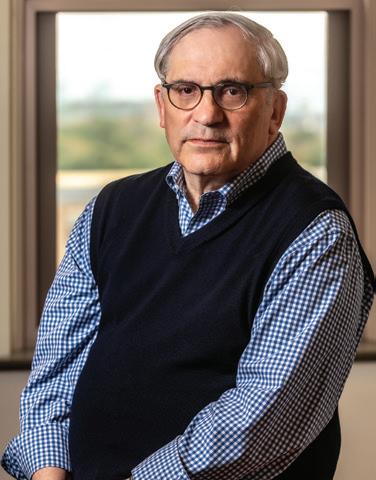
ate an honors program for the department’s most elite students.
Amidst these and other changes, Fishman says, questions arose about the direction of the communication program: Should it continue to be grouped with the theater program? Should some communication classes be taught by other schools or departments? Or should it be completely reconfigured as a standalone program in the College of Arts and Sciences? Fishman was a strong advocate for the latter option, and he strengthened the department’s public relations and advertising components, working to add curricula such as interpersonal communication. He also was a key asset in bolstering pre-existing programs to meet the needs of the ever-changing field and establishing BC’s chapter of Lambda Pi Eta, the Communication National Honors Society.
sistant debate coach at Northwestern University while a graduate student, helping lead the team to a national championship (it was also through debate that Fishman met Lindmark, then a fellow debate circuit judge). BC’s impressive debate legacy helped steer him to the Heights.
“I felt right at home,” Fishman says. “His class was challenging,” recalls Robert Rosenthal ’74. “He was a younger guy, and he had a good sense of humor. He was really cutting-edge in terms of his understanding of theory. Very bright guy, good teacher, and very interactive in the cold call.”
Once at BC, Fishman worked tirelessly on the Communication curriculum, helping institute its internship program and encouraging majors to pursue occupations in the field for credit, and working to cre-
Seeing advanced composition as a necessary skill set for students, Fishman took the lead in constructing a two-course writing-intensive requirement for all majors. He also was instrumental in the creation of the department’s media lab in Lyons Hall, providing students with the tools necessary to work in an increasingly digitized age, and he has continued to advocate for innovation.
“The Internet has changed the nature of society,” he says. “The digitization of America is real. People are going to have to adjust, and you see the landscape changing.”
For Fishman, it is the day-to-day victories that testify to success, but not just his—the department and the students it serves.
“We want our students to be competent, we want them to be good thinkers, and we want them to be good people along the way.”
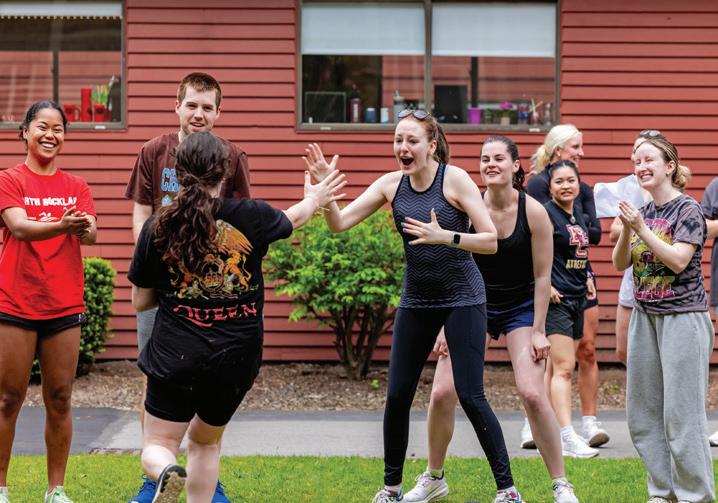
May 23, 2024
APPRECIATION
Associate Professor of Communication Donald Fishman
photo by lee pellegrini
Among the Senior Week activities for the Class of 2024 were relay races in the Mods (above), the 100 Days Dance, the Senior Toast, and the Commencement Ball, organized by the Senior Week Student Committee and Office of Student Involvement staff.
Snapshot Last Hurrah
12 Chronicle
PHOTO BY CAITLIN CUNNINGHAM






























 photo by lee pellegrini
photo by lee pellegrini



